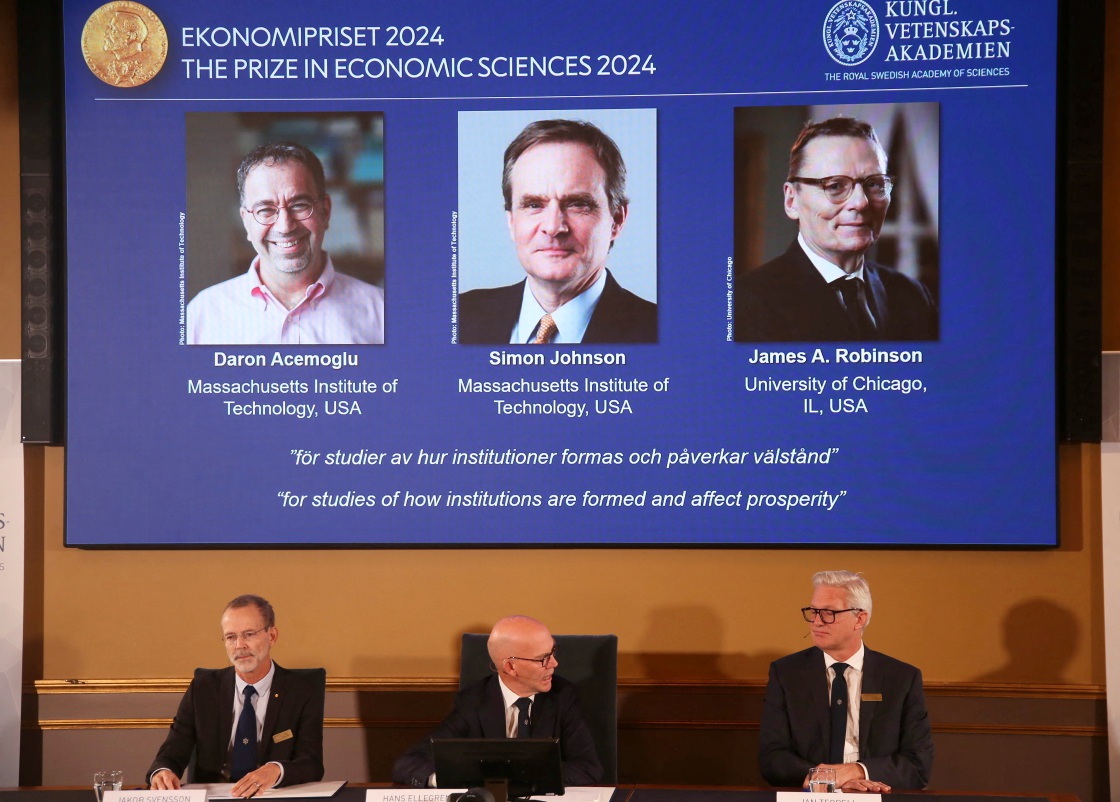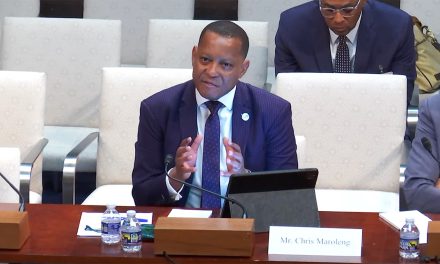One of my favourite economists has eventually won a Nobel prize, with Simon Johnson and James Robinson. Daron Acemoglu’s work has shaped my outlook on development perhaps more than any other thinker.
Their prize comes 23 years after the authors’ epic paper “The Colonial Origins of Comparative Development: An Empirical Investigation” was published in the American Economic Review in 2001. Using a novel econometric technique, they “instrumented” settler mortality (among European colonisers) to understand the nature of the relationship between institutional quality and economic outcomes. The upshot is that where colonial settlers’ survival rates were higher, the institutions they built produced more broad-based prosperity than in other areas (often wealthier in natural resource abundance) where mortality was higher.

Academy of Sciences officials Hans Ellegren, Jakob Svensson and Jan Teorell award the Swedish Riksbank’s prize in economic science to Daron Acemoglu, Simon Johnson and James A Robinson. Picture: REUTERS/TOM LITTLE
You can imagine that the findings have proved controversial. I remember the 2004 editions of the Journal of Economic Growth, for instance, in which several scholars debated the merits of the argument. Glaeser and his co-authors argued, on the one hand, that instrumenting settler mortality was capturing the more basic effect of human capital, and that high levels thereof and good policies were what propelled countries out of poverty. Dani Rodrik and his co-authors, on the other hand, found that the quality of institutions “trumps everything else” in respect of factors explaining divergent economic outcomes.
Acemoglu and Robinson expanded on the big idea of their 2001 work in an epic 2012 book, Why Nations Fail. For anyone looking to understand why institutional quality really is of primary importance for determining long-run economic outcomes, the book is key reading. Many authors favoured geographic and biological explanations; others preferred cultural factors. But Why Nations Fail shows in digestible detail why these other factors are unsatisfactory in their explanatory power.
Political consequences
Institutions determine how nations make use (or not) of their peculiar geographies and influence the evolution of societal norms through the ecological incentives they provide. Extractive institutions result in the literal extraction of rents at the expense of broad-based growth for the benefit of elite insiders (think “state capture” in SA). Inclusive institutions on the other hand, ensure broad-based property rights and uphold civil liberties. These produce sustainable, long-term development.
Perhaps my favourite paper of Acemoglu and Robinson’s is “Economics vs Politics: Pitfalls of Policy Advice” of 2013. Too many economists advocate for public policy that simply aims to reduce or remove “market failures and policy distortions”, but this ignores the impact of politics. In their words: “the extant political equilibrium may crucially depend on the presence of the market failure. Economic reforms implemented without an understanding of their political consequences, rather than promoting economic efficiency can significantly reduce it.”
This work dovetailed with the impressive work of another Nobel laureate, Douglass North, whose book Violence and Social Orders with John Wallis and Barry Weingast, was published in 2009. Acemoglu and Robinson write that the North et al book “also indirectly underscores that the ‘good economics is good politics’ dictum is fallacious by providing several counterexamples in the context of what they call the ‘natural state’,” in which warring elites construct often highly inefficient elite bargains to generate a shared rent pool in exchange for abandoning violence towards one another. The upshot is that policy impositions that are incentive-incompatible with the distribution of political power are unlikely to gain traction.
Delivers both
There are numerous states where governments are relatively effective, but citizens are repressed. These nations will not see the dividends of broad-based economic prosperity. China, for instance, will grow old before it grows rich. Dictators make strategic mistakes (threaten Taiwan, support Russia and North Korea and so on), cook the books and rewrite history to maintain power and keep citizens in subjugation. This arrangement may, at first, seem efficient but will prove deleterious in the long run.
To dispel further doubts about the causal direction and nature of the relationship between democracy and economic growth, Acemoglu and Robinson, collaborating with Suresh Naidu and Pascual Restrepo, published a 2019 paper in the Journal of Political Economy unequivocally titled “Democracy Does Cause Growth”. In their words: “Our baseline results show that democratisations increase GDP per capita by about 20% in the long run … The effects are similar across different levels of development and appear to be driven by greater investments in capital, schooling and health.”
Citizen strength
For this reason it continues to be our firmly held belief at Good Governance Africa that democracy is worth fighting for. Our theory of change, informed by The Narrow Corridor, is that strengthening government effectiveness and empowering citizens simultaneously will produce the economic dynamism required to address structural unemployment and poverty. That is because government effectiveness is a function of bureaucratic quality, robust rule of law, effective control of corruption and political stability.
In turn, citizen strength is a function of the extent to which the state upholds civil liberties such as academic freedom and the civil liberties of expression and association. Only democracy provides the mechanisms, if often imperfect (there is not only one type of democracy), for citizens to demand delivery and hold the government to account if it fails to do so.
We live in an international order in which there is no effective supranational body. In the words of Thucydides, “the strong do as they will, and the weak suffer as they must”. The only way to prevent the “weak” from suffering (in continued poverty) is to empower citizens to stand up to the state. That requires building domestic institutions that create the appropriate ecological incentives for a political equilibrium that is responsive to citizens, and an economic equilibrium that delivers dividends for them. International efforts to complement this are to be welcomed, but they should never be seen as replacements.
Acemoglu, Johnson, and Robinson have made profound contributions to economics and political economy. We should take their work seriously as we consider the most effective way to build narrow corridors in our respective countries.
This article first appeared in Business Live.
Dr Ross Harvey is a natural resource economist and policy analyst, and he has been dealing with governance issues in various forms across this sector since 2007. He has a PhD in economics from the University of Cape Town, and his thesis research focused on the political economy of oil and institutional development in Angola and Nigeria. While completing his PhD, Ross worked as a senior researcher on extractive industries and wildlife governance at the South African Institute of International Affairs (SAIIA), and in May 2019 became an independent conservation consultant. Ross’s task at GGA is to establish a non-renewable natural resources project (extractive industries) to ensure that the industry becomes genuinely sustainable and contributes to Africa achieving the Sustainable Development Goals (SDGs). Ross was appointed Director of Research and Programmes at GGA in May 2020.












